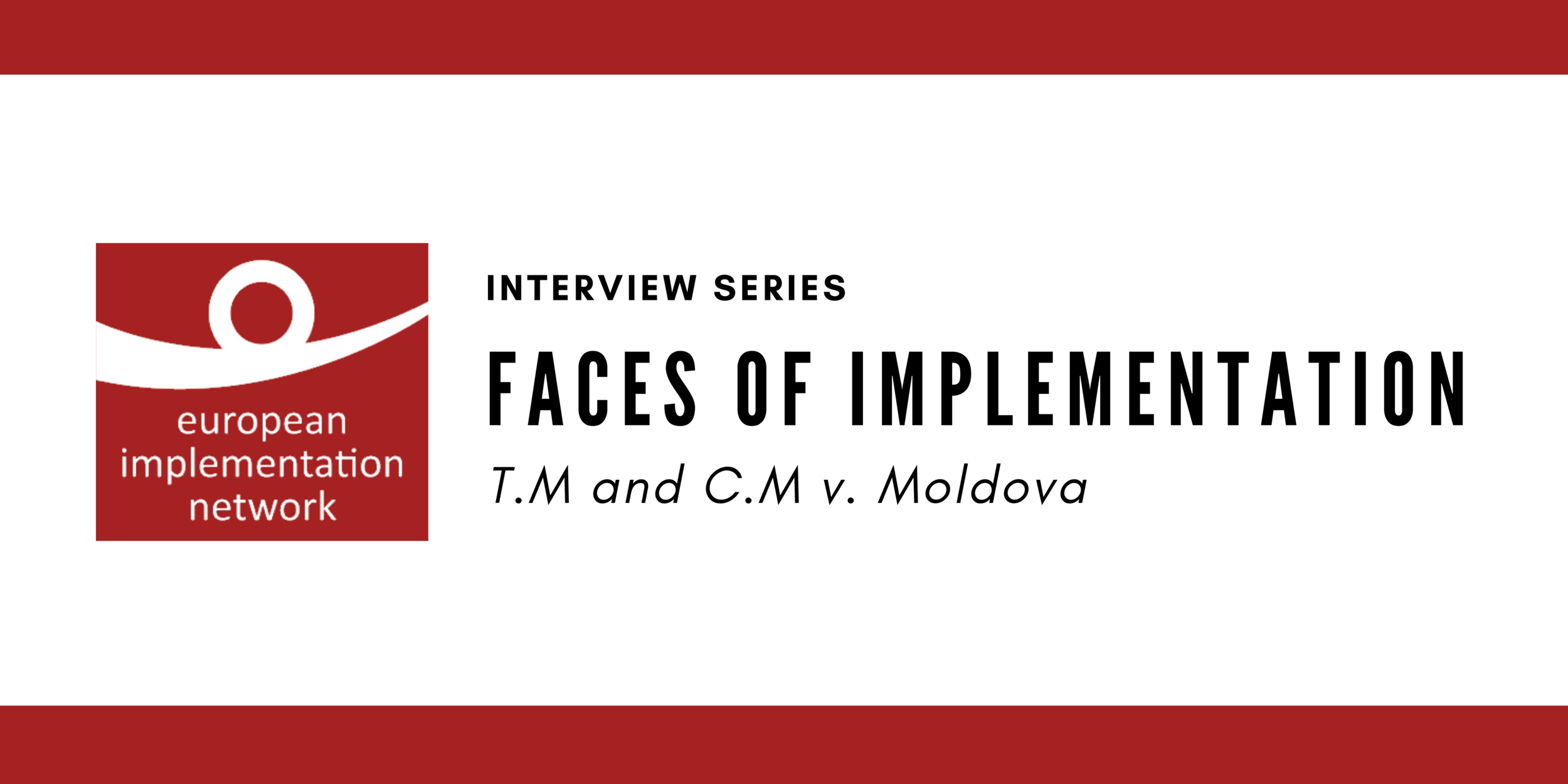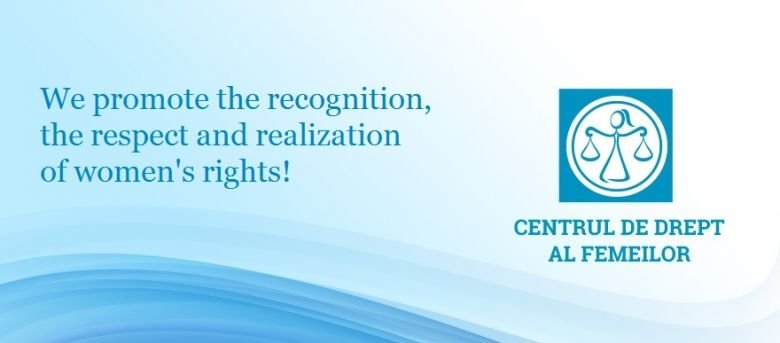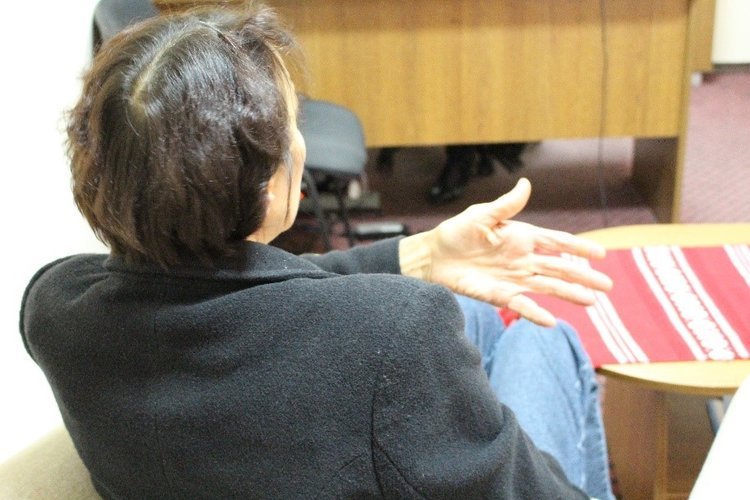Domestic violence is a systemic problem which requires the implementation of general measures in order to prevent violence and provide protection, justice and safety to victims. The case of T.M and C.M v. Moldova highlights the fact that domestic violence is a repetitive issue within Moldovan society, and the incremental reform process for addressing it.
We spoke with Violeta Andriuța from Women's Law Centre (WLC). Violeta is a lawyer and legal adviser, providing legal aid and representing victims of domestic and sexual violence in courts. She has made Rule 9 submissions to the Committee of Ministers regarding the implementation of the T.M. and C.M. case.
The Interview
Introduction
Image Credit: Violeta Andriuța
My name is Violeta Andriuța. I am a lawyer at the Women's Law Centre (WLC) in Moldova. The WLC is an NGO that promotes women's rights. Our organization provides holistic services for victims of domestic violence (DV) and sexual violence. I provide legal aid and representation in court regarding the rights and interests of victims of domestic and sexual violence, and I have been engaged in the implementation of the T.M. and C.M. v. Moldova case as well.
Background
The case of T.M and C.M v. Moldova concerns two applicants, a mother and daughter, fleeing domestic violence from the husband, respectively the father. The main focus of the case is the non-intervention of law enforcement to protect both applicants.
In 2014, the European Court of Human Rights (ECtHR) found that the authorities had violated the applicants’ rights not to be subjected torture, inhumane and degrading treatment, as well as the prohibition of discrimination, due to the discriminatory attitude towards them as women. In addition, the ECtHR also criticized the failure of the authorities, despite knowing of the danger of further domestic violence, to take effective measures, and to ensure punishment under the applicable legal provisions, and their failure to take effective measures against the perpetrator over several months.
There is a sense of general passivity by the Moldovan authorities when it comes to intervening in domestic violence cases, and this has been highlighted by the T.M. and C.M. case.
Victim of domestic violence supported by WLC in her efforts to obtain a Protection Order.
Image Credit: Diana Pinzari, Communications Specialist, Women’s Law Centre
Positive Developments
Thus far, we’ve made two Rule 9 submissions to the Committee of Ministers on the implementation of the T.M. and C.M. case, after the authorities have requested case closure. The immediate purpose of our Rule 9 submissions was to prevent premature case closure - which we were glad to achieve.
While much more remains to be done, we have seen some positive developments. For example, a new mechanism for law enforcement intervention has been introduced: the emergency restraining order. This was a response to the Court’s criticism of the non-intervention of the police.
After our first communication, the Moldovan Government Agent contacted the Women’s Law Center to set up a meeting to discuss potential measures. This contact was a positive step, and we were glad to see the openness from the Government Agent. During that time, WLC had been carrying out advocacy efforts towards authorities, but they were reluctant, failing to see domestic violence as a problem in Moldova. At the time, the authorities did not see the ratification of the Istanbul Convention as necessary.
Another positive development was the removal of the application of fines as a sanction for domestic violence. Before the legislative change, domestic violence offences would often be sanctioned with a fine. Under this previous law, it was victims who would usually pay the fine. Now, the sanctions for the perpetrator can be administrative detention and community service. This change ensures that the sanction will affect only the perpetrator and not make the victim pay out of her own pocket.
Translation: ‘Dear Member of Parliament, Hear Me Too!’ (Women’s Law Centre campaign)
Image Credit: Women’s Law Centre
Finally, we were glad that the Istanbul Convention was ratified by Moldova in October 2021, because the WLC had made this recommendation in each submission submitted to the Committee of Ministers of the Council of Europe.
Ongoing Challenges
We participated in the working group on domestic violence with the authorities. Within the working group discussions, the Women’s Law Center has always advocated against domestic violence being in the administrative code, and for increasing sanctions for perpetrators. However, the authorities were reluctant to increase sanctions, some even stating that “in a few years, we will find ourselves in the situation of having every other person convicted of domestic violence”.
As a result, domestic violence was partially decriminalized. After the legislative changes, domestic violence was classified as an administrative offence. Today, domestic violence acts in Moldova exist in both the criminal code and the administrative code, depending on the gravity of the injuries, with less serious injuries being under administrative offences.
This legislative change aimed to show that the number of domestic violence crimes is on the decrease. But if we look at the number of complaints, it is clear that the situation is completely different in practice.
Legal empowerment by WLC of a victim of domestic violence.
Image Credit: Diana Pinzari, Communications Specialist, Women’s Law Centre
Reactions to Government Communications
The authorities have provided one Action Plan and two Action Reports to the Committee of Ministers. We welcomed a few of the measures they set out, while highlighting again that more work is needed.
For example, the authorities communicated to the Committee of Ministers that domestic violence victims now have access to new shelters. While this is a positive development for victims, many shelters and services were opened and provided by NGOs. The government provided fewer services for victims than civil society. There are some changes regarding services for victims, but not enough.
While there are some specialized services in Chisinau, there are not enough services in all regions in Moldova. For example, in Transnistria, the situation is more severe, as they do not have a law on domestic violence and domestic violence legislation is not applied there. For domestic violence offences, regular criminal code provisions apply. Not only there is no law on domestic violence that can protect women there, but Transnistria only has one shelter. These services need to be improved and multiplied. It can't be said enough.
The International Conference on preventing and combating violence against girls & women and domestic violence on the 19-21 October 2021
Image Credit: Women’s Law Centre
Frustration
Engaging in the implementation process can be frustrating at times. Specifically, I’ll highlight a few aspects I found frustrating when replying to the government’s arguments.
The authorities believe that decriminalizing domestic violence aims to reduce overcrowding in prisons. However, this did not make sense, since domestic violence acts face a lighter criminal offence, and very few perpetrators end up in prison. So, in essence, perpetrators of domestic violence are not the cause of prison overpopulation.
Furthermore, when discussing free legal aid, we showed in our submissions to the Committee of Ministers the following statistics: perpetrators get free legal aid in 95% of cases, while victims only in 5 - 9% of cases. The government argued that they have to choose between providing a lawyer or dealing with an emergency protection order, in order to justify the low rates of legal aid to victims. As if the time needed to provide victims with legal aid and the need to promptly issue emergency protection orders are mutually exclusive.
Perpetrators can benefit from a lawyer in 3 hours, ensuring their rights are protected, while victims can’t have emergency protection orders for 24 hours, and in 24 hours, they cannot secure legal aid for victims. It’s contradictory.
Our frustrations come from fact that, when we read the position of the authorities, we understand the authorities are not sensitive to the subject, they are approaching domestic violence in a very formal way. We are still glad that such formal aspects are included in the action plans because it gives NGOs the opportunity to respond to them and make recommendations on those aspects. Our communications are also meant to sensitize the authorities on some of the issues they may not see.
Women’s Law Centre Team
Image Credit: Women’s Law Centre Facebook
WLC’s Advice to CSO’s
The implementation process allows us to pressure authorities, but also highlight problems within the system. We hope to shed light on these problems, of which authorities may not be aware of, and through this process, sensitize them to domestic violence issues. The implementation process also made us aware of how often the T.M. and C.M. case was recurring.
The ECtHR implementation process is necessary and, more importantly, civil society needs to have an active role. When these recommendations come from international organisations, authorities take them more seriously than when they come from a national NGO.
From our experience, there are approximately four NGOs in Moldova involved in ECtHR implementation, but it would be good to have more. Making recommendations as a joint effort from more civil society organisations and speaking in the same voice can create more sensitivity around the issue of domestic violence with the authorities.
Image Credit: CoE Website
WLC Response to Moldova’s Ratification of the Istanbul Convention
The ratification of the Istanbul Convention was one of the recommendations of the Committee of Ministers during the implementation of the C.M and T.M group of cases against the Republic of Moldova.
We have carried out many advocacy activities at the national and international levels to raise awareness among the authorities to ratify the Istanbul Convention. At the same time, the need for the Republic of Moldova to ratify the Istanbul Convention, which is the most important international treaty on the issue, was addressed by the WLC in each submission submitted to the Committee of Ministers of the Council of Europe.
Although several measures have been taken by the authorities to implement the C.M and T.M Decision, the ratification of the Istanbul Convention remains the most important positive development in the process of implementing the T.M and C.M group of cases against Moldova. At the same time, I understand very well that the ratification of the Istanbul Convention is a new beginning that requires a lot of time and effort to succeed in ensuring that every woman and child who has been affected by domestic violence receives adequate protection from the authorities in Moldova.
Relevant information on T.M and C.M v. Moldova:
Women’s Law Centre Reports:
Action Plans
Action Reports
NGO/NHRI Communications
CM Decisions
We always welcome feedback, please let us know how we can improve this series: contact@einnetwork.org
Image Credit by Nadine Shaabana on Unsplash











